KØFF’s Homebrew Tips
The 2 meter Square Copper Dipole by KØFF
Originally published and copyright by KØFF 5 Dec 2000 on eHam

Construction Detail
Here
is the parts list and dimension sheet for a 2m square dipole, made from copper
plumbing fittings and ½” copper water pipe.
It is more or less omni-directional, and
horizontally polarized.
You
can even make it from the short pieces of pipe left over from the 6M project
(see eHam how-to article “6 Meter Square Copper Dipole by KØFF”).
The
antenna presents a low-through-high angle of takeoff, and is intended for use
in the 144.200 area, although it’s wide enough to use as an AO-27 uplink, and
can handle 100W. It’s particularly useful on AO-27 when the pass is very high
or overhead, and in the “cone of silence” of a fixed vertical. I use this for
mobile satellite uplink, and wave a short hand-held 430 antenna out the window
for receive. Excellent results from SSB mobile too, where I’ve been able to
talk to other mobiles similarly equipped 200 miles away. The mounting
arrangement allows it to be affixed to a standard mobile mast that presents a
3/8 x 24 male thread (ALA Hustler base mast). You run coaxial cable right to
the antenna and connect it to the built in SO-239.
The
only adjustment on it is the Gamma match, as the design dimensions set
resonance. You may want to adjust the final SWR by sliding the end caps in or
out before soldering them.
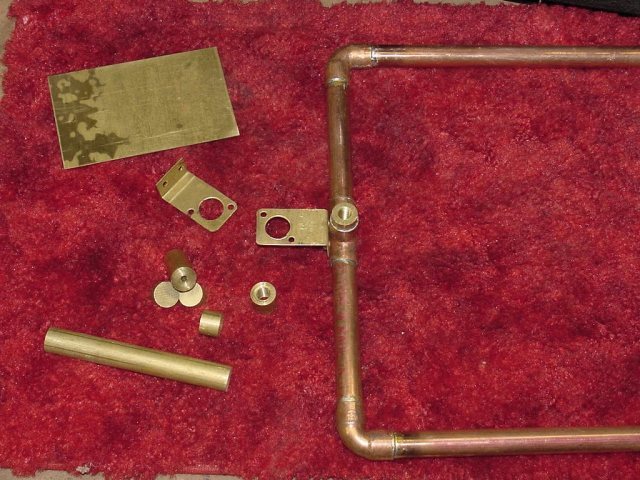
BRASS PARTS
It's
just a dipole folded around on itself.
The
shape is an open 11” with mounting via a copper TEE with the open end down. In
that open end solder a 1/2" brass rod, which has been drilled and tapped
for 3/8-24.
For
stacking a pair, you could make the TEE and threaded insert come horizontally
instead, and mount one antenna above the other. (Future articles will give
detailed info on stacking antennas in general). Stacked antennas provide
improved gain and power handling capabilities.
Side mounting on a tower can be achieved by using conduit clip large enough to go around the mast (or tower leg), and run a 3/8 x 24 s.s. bolt into the threaded fitting.
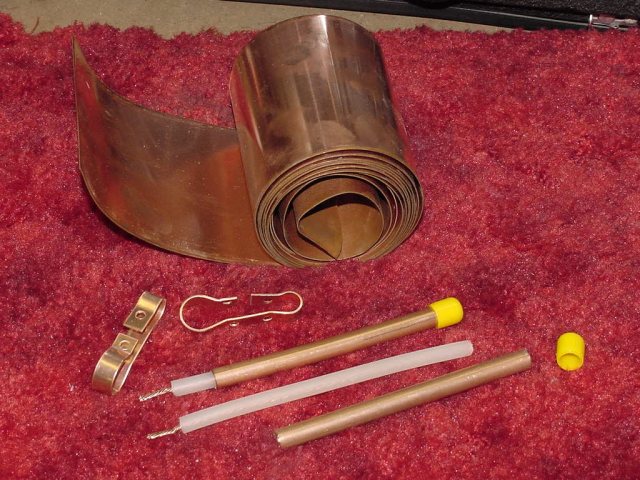
Copper Parts
Solder
the antenna parts together per the drawing using the 90
degree
elbows at the corners. Cap the far (open) ends and mind the gap. All
measurements are critical. The brass plate* to hold the SO-239 is bent to form
an "L" 1-3/4" tall with
a 1/2" lip. A 5/8 hole is provided 1-1/4 inch from the bend, and the
SO-239 is attached using stainless steel or brass hardware*. Two small holes
are drilled in the lip and the plate is mounted to the copper TEE with #6 s.s.
Self-taping screws*. Solder a ring lug* to the center conductor of an 11"
piece of RG8 insides* and screw it into the threaded coupling* on the SO-239
*(center wire and plastic dielectric only- remove and discard shield and outer
covering). Slip the RG8 insides into the 3/8" copper tube* 4-1/2",
and tap the copper tube to the radiating element 3-1/2” from the SO-239 center, with a copper strap bracket *.
The
tap on the Gamma sets the impedance presented to the feedline.
Resonance (center frequency) is designed into the measurements.

PARTS
PLACEMENT

Gamma
Tap

Parts
for Gamma, both 6 and 2 Meter Versions. Roll the tubing straight between two boards.
Materials List
½” copper water pipe:
2
ea. 3 ¼” ( capped end)
2
ea. 4 ¼” (TEE end)
2
ea. 9 ½” (Sides)
4
ea. ½” copper 90 degree elbows*
1ea.
½” copper TEE*
1
ea. ½” copper caps
5”
of 3/8” copper refrigeration tubing ( Gamma Tube)*
6”
of RG-8 insides with solder lug*
Brass
Plate for Coax connector*
1
ea. SO-239 with Brass threaded insert*
1
ea. Brass rod, threaded for 3/8x24 for mast attachment*
1
ea. ½” wide copper strip ( Gamma tube bracket)
Misc.
stainless steel screws and hardware*
* Denotes kit items. Contact [email protected] for availability
Kits
include all parts, machined and punched ready for assembly, except the straight
copper water pipe pieces. The 6 or 2 Meter kits are $18.00/ One or two kits can
be sent via priority mail for $4.00
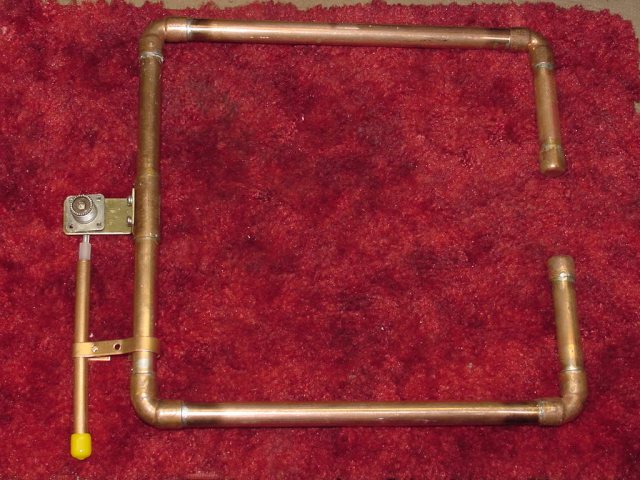
Nearly
Complete
Have fun on 2. Geo>KØFF
THE 6 Meter Copper
Loop
Here is the parts list and dim. sheet for a 6m Square Copper Dipole, made
from copper water pipe.

Characteristics:
It is more or less omni-directional, and horizontally
polarized.
Copper is the best possible electrical conductor at normal
temperatures, next only to silver.
Copper conducts better than gold! Antenna efficiency is the
RADIATION RESISTANCE
of the antenna, divided by the ELECTRICAL RESISTANCE. An
antenna made from copper
is 1.6 times more efficient than the same antenna made of
aluminum.
It presents a high angle of takeoff when mounted low, and singly (great for
Es), can handle 100W. Stack two or more for extra gain if needed.
It's just a dipole folded around on itself, and supported at the far (open) end
with a plastic insulator.
"Bent Dipole" might be a good term, as a
"Folded Dipole" is quite another thing.
The Gamma Match:
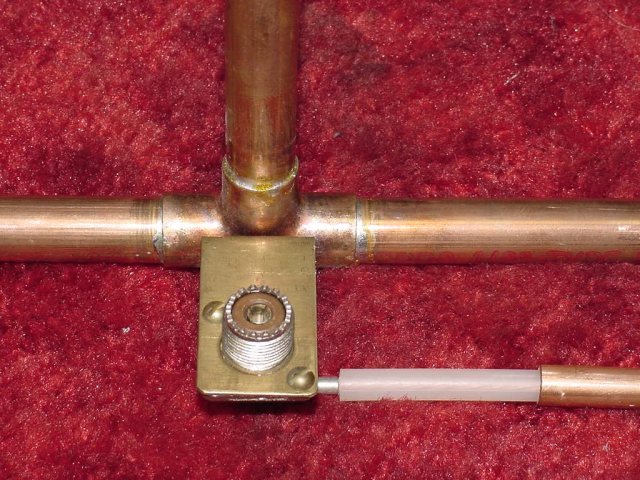
A low VSWR may be obtained by adjusting
the Gamma Match shorting bracket position, and also the
length of the tubing
and shorting bracket. The Gamma bracket "finds"
the 50 Ohm point along
the element, and connects that to the Coax connector via the
Gamma tube.
The additional length of tube adds inductance into the
circuit, and this is
canceled out by the series capacitance formed between the
insulated Gamma
wire and the inside of the Gamma tube.
Description:
The shape is a closed 28" square, with a mounting /support bar through the
middle.
This mounting bar is attached to a copper TEE at the drive end, and to a
CPVC TEE at the other end. The CPVC TEE acts as support and end-insulator
for the radiating element and provides a mounting point for the Butterfly.
INSULATOR:

A large (3/4") part is used, and adapted down to fit
the water pipe, to increase its insulating qualities, as there is very high
voltage at this point. A strip of brass or copper 1/2 by 3" is screwed to
the outside middle portion of the CPVC Tee, through a small center hole, and
is rotated one way or the other as a resonance tuner (Butterfly). When the
Butterfly is at right angles to the element, the frequency
is the highest, when
Parallel, it's the lowest.
A Gamma match sets the impedance to 50 Ohms, and the
Butterfly adjusts the center
frequency. Center frequency is 50.00 to 50.800 with the exact dimensions shown
Typically the 2:1 SWR bandwidth exceeds 500 kHz.
Mounting:
A U-bolt and saddle through the central tube provides a center mounting
point. Another approach is to install a copper TEE in the center tube, with
the open end down. In that open end solder a 1/2" brass rod which has been
drilled and tapped for 3/8-24.
Side mounting on a tower can be achieved by using conduit clips to fix it to
a horizontal mast.
In some climates where water is a problem, drill small weep
holes in the bottom corners.
A spray coat of Krylon Clear Enamel will keep the copper
shiny. If used mobile, you may use
a colored paint, the same shade as your vehicle.
Construction:
Material:
1/2" Copper waterpipe :
3 ea. 27 inch piece
4 ea. 12.5 inch piece
1 ea. 13.5 inch piece 3/8 i.d. Copper refrigeration tubing ( Gamma tube) *
1 ea. Brass plate 1/2" x 3" (Butterfly) *
1 ea. Brass plate: 1"x 2-1/4 in (to mount SO-239, Gamma rod) *
1 ea. Copper strip 3/8 x 4" to make Gamma tube bracket
*
4 ea. Copper 90 Degree elbow
1 ea. 3/4 CPVC TEE
3 ea. 3/4 to 1/2 CPVC reducer
1 ea. Copper TEE
1 ea. 11" piece of RG8 insides (center conductor and insulation, Discard
shield
and outer plastic) *
1 ea. SO-239 coax connector (with tapped mounting holes and
center pin) *
1 Lot Stainless Steel and Brass screws and Hardware *
Glue two of the 12.5" pipe sections into the CPVC reducers first, then
glue
the reducers into the opposite sides of the CPVC TEE.
Lay the assembly on a flat surface with the center opening
of the TEE
facing the middle of the antenna. This is where the first 27" piece
(mounting bar) goes in, via a reducer. On the outside edge of the CPVC TEE is
where
the butterfly attaches. For mobile or portable use, use 3 s.s. #6 screws
through
each of the CPVC TEE joints for added strength.
The rest of the antenna solders together to form a square, using the 90
degree elbows at the corners. Drill small weep holes in the bottom corners of
all four 90s
to let accumulated water drain out.
The brass plate is bent to form an "L" 1-3/4" tall with a
1/2" lip. A 5/8
hole is provided 1-1/4 inch from the bend, and an SO-239 is attached . Two
small holes are drilled in the lip and the plate is mounted to the copper
TEE with #6 s.s. self taping screws. Attach the center conductor of an 11"
piece of RG8 insides to the center pin (center wire and plastic dielectric
only- remove and
discard shield and outer covering). This is accomplished by soldering or using
a screw if
the SO-239 has a threaded center pin *
Slip the other end of the RG8 insides into the
3/8"copper tube 10.5", and tap the copper tube to
the radiating element 13-1/2" from the SO-239 center,
with the Gamma tube bracket.
The tap on the Gamma sets the impedance presented to the feedline.
Resonance (center frequency) is adjusted by turning the butterfly.
THE BUTTERFLY:
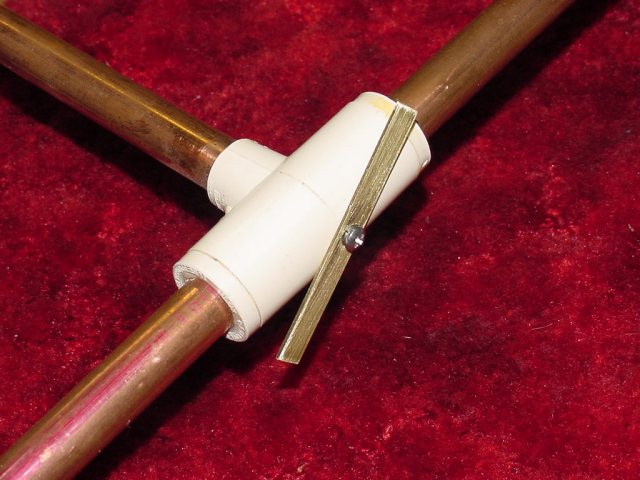
Mount 15 feet or more high, for home use, and wherever you can for mobile.
An antenna like this can be mounted 3" to 6" above the roof of a
vehicle
using CPVC >, PVC or acrylic spacers with suction cups.
Have fun on 6. Geo>K0FF
*Parts available in
a kit from author, includes all "*" parts, drilled, punched,
bent, and
threaded : [email protected]
Don't Eat the Batteries" clause:
Recently my wife and I bought a new TV set, and in the
instructions for the hand
held remote control the warning said "Don't Eat the
Batteries".
SO:
WARNING * This is antenna is an electrical conductor.
Contact with power lines can
result in death or serious injury. Do not install this
antenna, supporting mast or tower
structure near any power lines, or where they could come
into contact with power lines
should the antenna or structure fall.
Geo>KØFF
The First 6M DXCC from Missouri
The Only Zero with 5BDXCC and endorsements for 160/17/12/6
Meters.